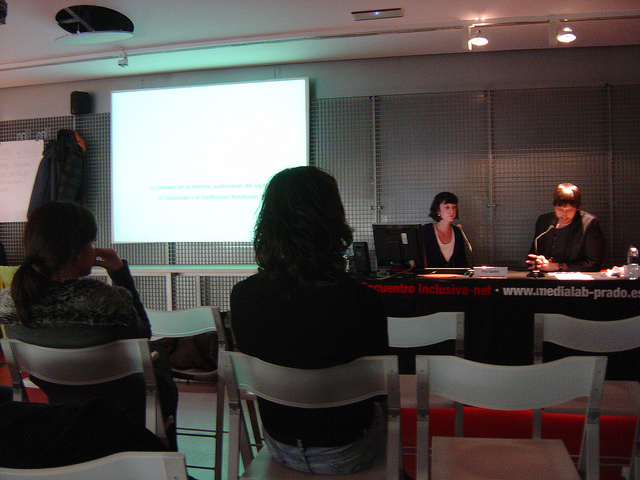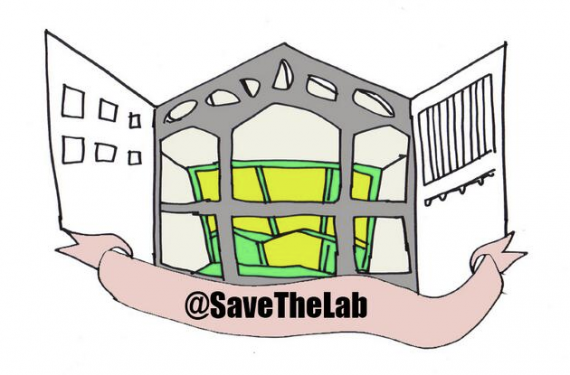Top image by Carla Boserman. Article cross-posted from Bollier.org.
For people who care about socially engaged, commons-minded tech innovation, there are few institutions in the world as bold and courageous as Medialab Prado, in Madrid. For the past 10 years, it has been a technology lab, an interdisciplinary forum, a space that welcomes public participation, a hub for citizen activism, and a host of provocative workshops and conferences. And, yes, the Medialab Prado has also been deeply engaged with the commons paradigm as an important way of shaping a better, more socially constructive future.
Now, after a decade of fantastic work as a pioneering social/technological laboratory, the Madrid city council is threatening to let a giant telecom corporation, Telefónica, take over its new building. The municipal government – apparently clueless about the international stature and significance of Medialab – is in talks to let Telefónica use the brand new building that MLP moved into less than a year ago. Telefónica wants to open its own startup incubator there. The move would cast Medialab into limbo, without any assurance of appropriate space in a suitable location or adequate funds.
Many of us who participate in the international tech, P2P, commons, or activist worlds are appalled at this recent turn of events. Doesn’t the Madrid political establishment recognize the immense value that Medialab Prado has for the city and Spain (and the rest of the world)?
Doesn’t it realize that Medialab is a magnet for the most exciting thinkers, technologists, and social activists – a place that elevates Madrid’s reputation and Spain’s leadership in cultural and tech circles? After citizen uprisings in so many countries around the world, does the Madrid political establishment not appreciate the need to explore new models of social outreach and public engagement, as Medilab Prado does?
As a multinational corporation, Telefónica surely has plentiful resources to open up its own startup venture without displacing and crippling the Medialab. Or is that the point – to sabotage a socially minded center that has other priorities than the corporate bottom line? The city council's move certainly appears to be a classic enclosure of the commons.
Several years ago, I met the gracious director of Medialab Prado, Marcos Garcia, when I was in Madrid. Even though the Medialab occupied a much smaller space then, it was clear that the center was an exciting place to explore new ideas, connect with unexpected personalities and thinkers, and imagine how tech could serve humanity in new ways.

Medialab Prado. Photo credit: Nicholas Knouf.
Here is what by Bernardo Gutiérrez, writing at Guerrilla Translation, a Madrid-based activist/translation group, recently wrote about Medialab Prado:
….as Juan Freire and Antoni Gutiérrez Rubí express in their book Manifiesto Crowd, in the age of networks, innovation walks a different path. “The factories that were churning out companies in the 20th century are dead. The 21st century is witness to the birth of spaces for collective innovation.” An incubator lacking a community will never be enough. This is the reason why a lab – both in its physical and digital realms – needs to be an open platform. And that is precisely why MediaLab Prado has become such a relevant space for coexistence, innovation, and mutual co-creation.
MediaLab Prado is both a physical and a digital platform. Physically, it’s a space where anyone can walk in, while online it functions as a laboratory for connecting ideas. MediaLab Prado is an interdisciplinary workspace for creation and innovation. And here’s an important detail: its strength doesn’t reside in its own programming, put together by stewards and specialists. It lies instead in the various working groups, projects and encounters collectively cooked up by the citizen communities who frequent Medialab’s headquarters, or participate in its digital channels. Every Friday, for example, there’s an open lab where anyone can collaborate with anyone else in the creation of new projects.
So, what is a lab, exactly? A technical laboratory? A multidisciplinary space open to the public? Rather than nailing down one definition, it may be better to observe some of these labs worldwide, and notice the local idiosyncrasies. Any city eager to reinvent itself and adapt to the networked society invests in an urban lab, such as the Laboratorio Procomún in Rosario, Argentina. Cultural centers like, for example, Ljudmila Media Lab (Liubliana, Slovenia) are currently mutating into places where the artistic paradigm goes beyond art objects. Digital art spaces, such as the prestigious Eyebeam in New York, are recycling themselves following collaborative models. All of the above share a common source of inspiration: Medialab Prado Madrid…..
The key to MediaLab Prado’s success may be held in a definition first proposed by José Luis de Vicente: “It’s a community incubator.” In fact, both words, “community” and “incubator,” have been the trend amongst Silicon Valley circles and community managers alike. It’s also worth noting that, as terms, they are seldom seen together.
So what we can you and we, the international community, do to show solidarity and support for Medialab Prado and try to prevent the crippling or loss of Medialab?
1. Write a statement or blog post on your own website explaining why you appreciate and value the role of Medialab Prado and show your concern for how the current situation could threaten it. The defense collective will link to such posts to demonstrate Medialab’s breadth of international support.
2. For people with affiliations with universities, museums or companies, send a signed letter of support with the logo of your organization. Send it to José Luís De Vicente, director of the Visualizar Program for Data Culture and part of MediaLab’s defense collective, by going to De Vicente's website and emailing him. He will post letters on the MLP website and send them to the Madrid City Council.
3. Embed a short video featuring international supporters of MLP, recorded last year, on your website.

Medialab Prado. Photo credit: Nicholas Knouf.
These three suggestions come from an Open Letter pleading for help. Here is a complete version of the letter:
Dear Friends,
Probably many of you have already heard about the serious problems that Medialab Prado is undergoing currently that threatens to stop the activity of the center and maybe, in the mid-term, it’s very existence. I know many of you have in the past years taken part in projects and activities there, and have good memories of the institution. Even those of you who have not been there have heard about it and know it’s an interesting, lively place that has made significant contributions to this community. Now it needs as much support from the community as possible to go on.
What is going on?
Less than one year ago, Medialab Prado opened, after five year of renovation and six million Euro of public investment, a brand new building. A new facility that multiplies the size of the previous space by eight and creates all kind of new opportunities, with much better resources. While the previous space kept the organization relatively under the radar for many in the city council, the new building is really iconic and has raised the profile of the organization considerably.
Recently we have learned that major telecommunications multinacional Telefónica is looking for a building in Madrid to set up its new startup incubator and has expressed interest in the Medialab Prado building. The City Council, always eager to please, has considered the request and has acknowledged in public that they are under negotiations to satisfy this request. The implications for Medialab Prado are, obviously, quite serious. While they insist in theory on keeping their support for the institution, the reality is that:
- They have not made a firm offer of a new space that is already available and in the right conditions to continue the program with no major disruptions.
- They have not committed to invest any resource in allocating the center in a new space.
- They have not guaranteed that any transfer could be done promptly and without a long transition that could stop the activity in the center for many months.
The reality is that Medialab Prado could be stuck in a limbo for a very long period, and any development from the possible eviction onwards is at this point very uncertain. The community of users of Medialab Prado has serious concerns that this could start a process that could end with the death of the institution.
To make things worse, it’s important to notice that the building that Telefónica wants to take over has been renovated with public money and with the specific goal of being a cultural facility.
How can you help?
We need to show the City Council in clear terms that Medialab Prado is an important institution that is highly respected and valued internationally. One of the most ironic aspects of this situation is that given the problems they’ve always had to understand what is Medialab Prado — not being a museum, a gallery, or an arts production center — they have never been understood that this is one of the most influential and valued cultural institutions today in Madrid and Spain.
There’s no one better than you to help us to make them understand how important is protecting and preserving the valuable role that Medialab Prado has played in the last ten years. For this, we are requesting any of these three things:
1. A statement or blog post in your own website explaining why you appreciate and value the role of MLP and showing your concern for how the current situation could threaten it. We will link to it and translate it from the website of support we are currently setting up, that should go live in the next hours.
2. For those of you with affiliations with universities, museums or companies, a signed letter of support with the logo of your organization. If you can send it to me I will get it into the website and also printed to send them all together to the City Council.
3. A short video that we can embed in the website, offering your support. Here are some videos from one year ago — before the crisis started — that can be used as a model.
That is all. If you have other suggestions or contributions, please let us know. Thanks for helping us keep Medialab Prado alive.
Best,
MediaLab-Prado









